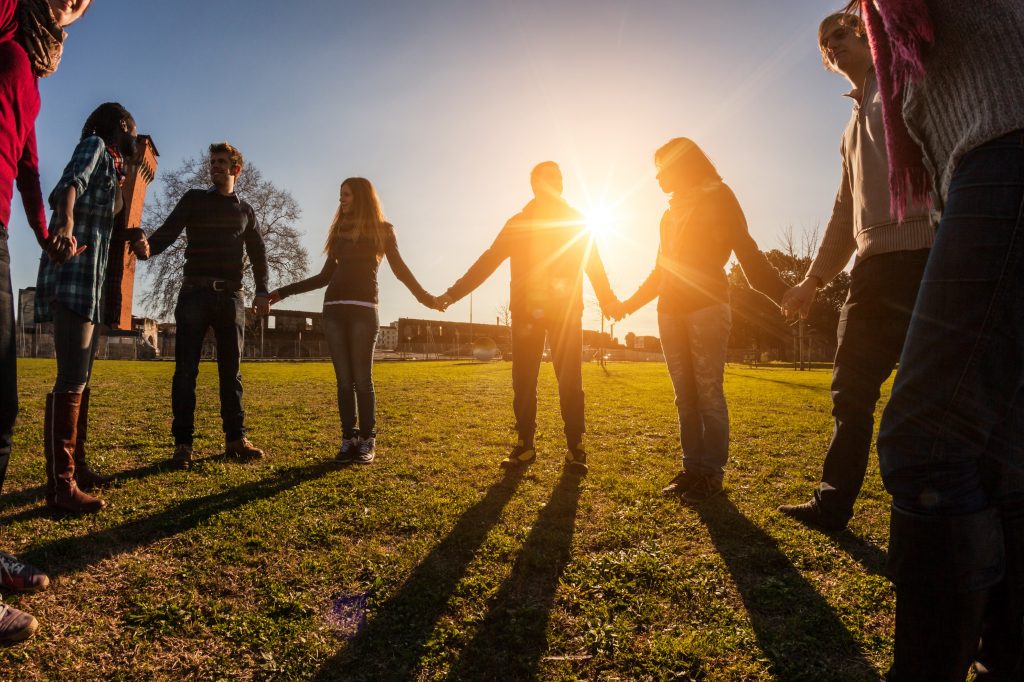
I recently had the pleasure of attending the national Facing Race conference for the first time. It was an enormously informative and inspiring three days, full of learning and connecting with the 3,500 other attendees, all of whom advocate for justice and equity in some way. During the conference, one of the speakers shared this quote with us, “We are spiritual animals, and without the spiritual part we’re just animals.” This notion, and the context in which it was shared, has brought a lot into focus for me about the intersection of faith and social justice.
One of the first things I came to appreciate on a deeper level is the importance of faith institutions, particularly Black churches, in working toward collective liberation. I recently got to see the documentary Baltimore’s Strange Fruit, produced by Black Yield Institute. The film explores the historical and current effects that systemic racism has had on land and food sovereignty for people of color. One portion of the film focuses on the Black Church Food Security Network, and emphasizes that Black churches are and have been the strongest and most independent Black institutions. Thinking of the numerous other examples that illustrate this point has made it clearer to me just how important an organizing tool our faith institutions are.
I’ve also begun to appreciate that, on a personal and emotional level, spirituality has a profound effect on our work. I attend many meetings in which we start with a “sacred space” teaching, where someone will share some wisdom that evokes the sacred. I used to wonder why such a practice was necessary. It seemed to me that there was no need to bring a spiritual component into a meeting where there was fairly routine business to attend to. But as I’ve spent more time, and become more involved in, doing social justice work, I see the emotional and physical toll that it takes on those who do this work. The act of creating sacred space allows us to find a deeper connection to our work and to each other, and provides a much-needed spiritual lift.
Beyond just providing support to those who do social justice work, spirituality can be a vital source of healing to all those who have been marginalized. During the Facing Race conference, I heard many references to this idea that our marginalized communities must first be allowed to find healing from the trauma they’ve endured. One organizer told us that when she first meets with a community to find out what issues they’re facing, she begins with spiritual renewal before discussing policy. She told us the story of how heartbroken she was when she met with West Virginia residents who didn’t think that they deserved to have clean water because resource extraction is such a prominent part of their state’s economy. Spiritual renewal can play an important part in healing the psychological toll of oppression.
These frequent references to faith and spirituality in social justice spaces make it clear that faith culture will always find its way into our work. Our work is very much about culture. We work to change the dominant culture in this country to be more inclusive. We work to teach others how to honor cultures other than their own. If we distance ourselves from our faith culture, we are distancing ourselves from anyone else who is close to theirs.
For many who do this work, connecting with spirituality is a great source of strength. I imagine spirituality as a deep well of emotional sustenance that we can tap into when we feel weak, or when we feel our faith that change will come begin to wane. Believing that we can make an impact, believing that others will listen, can sometimes feel like a hard leap of faith to make. It is a great blessing, then, to be able to lift our spirits together.
Noah Mitchell is Program Coordinator for the Baltimore Jewish Council, and a member of the 2018 ICJS Justice Leaders Fellowship.
Baltimore is part of a national conversation around questions of justice, race, and community. Members of the ICJS Justice Leaders Fellowship consider how Jewish, Christian, and Muslim teachings and practice can contribute to the public conversation about (in)justice. Opinions expressed in this blog are solely the author’s. ICJS welcomes a diversity of opinions and perspectives. We do not seek a single definition of justice between or within traditions.